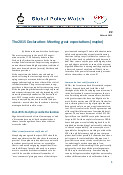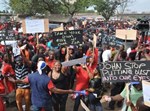Published on Fri, 2015-07-03 11:54
The need to prevent the damaging drainage from developing country economies represented by illicit financial flows has been gaining international attention. In a recent report (“the Report”) the UN Independent Expert on Foreign Debt and Human Rights, Mr. Juan Pablo Bohoslavsky (“the Expert”), added his voice by developing the implications human rights law and principles have for action on this front. |
Published on Wed, 2015-07-01 22:57
The June negotiations round on the outcome document for the post-2015 development agenda ended without resolution of the means of implementation issue. The 6th session of the Post-2015 intergovernmental negotiations was held on 22-25 June at the UN headquarters in New York. Means of implementation (MoI) have been the subject of many disagreements during the Sustainable Development Goal (SDGs) negotiations in 2013-2014 when many developing countries wanted to have MoI under each specific goal while developed countries wanted to keep MoI only under goal 17. Now the discussions are about how MoI should be integrated into the post-2015 agenda as well as how the outcome of the Financing for Development (FfD) track should be incorporated into the final outcome document. The current disagreements show a clear North-South divide. |
Published on Mon, 2015-06-29 00:00
While negotiations on Financing for Development and the means of implementation of the Sustainable Development Goals (SDGs) within the UN are deadlocked, a new Global Financing Facility (GFF) in support of Every Woman Every Child is going to be established outside of the UN. The creation of the GFF was initiated by the World Bank and the governments of Canada, Norway, and the United States, and announced at the UN General Assembly in September 2014. It will be officially launched in July 2015, at the third Financing for Development Conference in Addis Ababa, Ethiopia. The GFF is expected to play a key role in financing for reproductive, maternal, newborn, child and adolescent health (RMNCAH) and will serve as a major vehicle for financing the proposed SDG on healthy lives. It is being positioned as the most important new funding mechanism for the SDGs and the Post-2015 Agenda, similar to the Global Fund or GAVI. |
Published on Fri, 2015-06-26 15:17
What can New York learn from Geneva? Can human right mechanisms, such as the Universal Periodic Review (UPR) developed by the Human Rights Council in Geneva serve as a model for the follow up of the new development agenda currently beingdiscussed in New York? That was the guiding question formulated by Hubert Rene Schillinger, director of the Friedrich Ebert Stiftung in Geneva to a panel on “accountability mechanisms for implementing the SDGs” held last June 18. Irish ambassador David Donoghue, co-facillitator of the drafting process of the new development agenda admitted that “accountability” is referred to as “the a word” in New York and he explained that “to address sensitivities in various quarters, the phrase we use is ‘follow-up and review’ instead”. |
Published on Fri, 2015-06-26 14:59
The country is experiencing its worst energy crisis in over a decade which is paralysing the economy and ruining livelihoods. Two public demonstrations were held late February in Accra and Kumasi, Ghana's two main cities, over electricity load-shedding which gives consumers 12 hours electricity and 24 hours total blackout. But while the opposition-led demonstrators were thumping the streets with anti-government placards and slogans, organised labour in the country took up the struggle on a different front largely ignored by organisers of the demonstration but which many consider as being at the heart of the energy crisis. |
SUSCRIBE TO OUR NEWSLETTER







